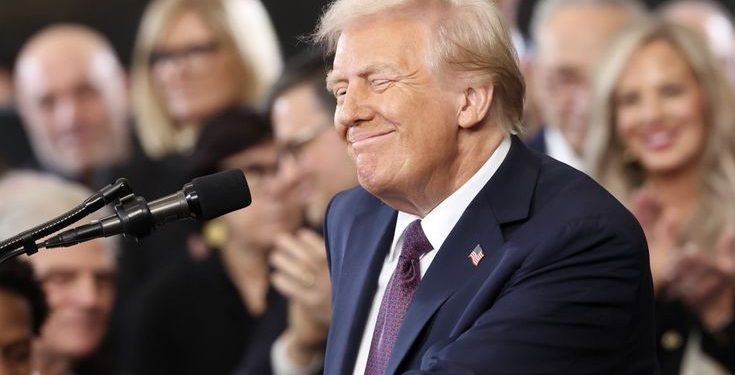President Donald J. Trump has declared that Christianity in Nigeria is “facing an existential threat,” citing the killing of thousands of Christians allegedly by “radical Islamists.”
In a post released on his official social-media account, Trump announced that he is designating Nigeria as a “Country of Particular Concern” for severe violations of religious freedom. He also called on Congress to investigate the situation and report back to him, urging immediate action to protect Christian populations around the world.
“Christianity is facing an existential threat in Nigeria. Thousands of Christians are being killed. Radical Islamists are responsible for this mass slaughter,” Trump wrote. “When Christians, or any such group, are slaughtered like is happening in Nigeria, something must be done. The United States cannot stand by while such atrocities are happening in Nigeria and numerous other countries. We stand ready, willing, and able to save our great Christian population around the world.”
The president specifically named Congressman Riley Moore, Chairman Tom Cole, and the House Appropriations Committee, instructing them to “immediately look into this matter” and provide recommendations.
What the Designation Means
Under the U.S. International Religious Freedom Act, the term Country of Particular Concern is applied to nations that commit systematic, ongoing, and egregious violations of religious liberty. The designation can trigger diplomatic pressure, sanctions, and foreign-aid restrictions.
The Situation in Nigeria
Over the past several years, numerous incidents have drawn global attention to violence affecting Christians in Nigeria. Church bombings, shootings, and mass abductions have been reported in several states, including Benue, Plateau, Kaduna, and Ondo.
Among the deadliest incidents was the June 2022 attack on St. Francis Xavier Catholic Church in Owo, Ondo State, where dozens of worshippers were killed during Pentecost Sunday Mass. The government later arrested several suspects linked to Islamic State West Africa Province (ISWAP).
Other attacks in Kaduna, Benue, and Plateau States have left hundreds dead and entire villages destroyed. Independent rights groups and humanitarian agencies estimate that thousands of Christians have been killed in religiously or ethnically motivated violence since 2009.
However, analysts note that the causes of Nigeria’s insecurity are complex. While some attacks are clearly ideologically driven, others stem from banditry, herder-farmer disputes, resource competition, and insurgency, blurring the line between religious persecution and broader communal conflict.
The Nigerian Government’s Response
The Nigerian federal government has consistently rejected the notion that Christians are being systematically targeted for their faith. Officials argue that violence in the country affects both Christians and Muslims, and is primarily rooted in criminality and regional instability rather than religion.
President Bola Ahmed Tinubu has publicly dismissed allegations of religious persecution as “a lie from the pit of hell,” insisting that his administration remains committed to protecting all citizens equally. His government points to ongoing military operations and arrests as proof of active engagement.
Church Leaders Push Back
In contrast, the Christian Association of Nigeria (CAN) and several leading clerics have condemned the government’s denial of faith-based targeting. Church leaders say that repeated attacks on churches and worshippers indicate a clear pattern and have called for stronger protection and accountability.
CAN has urged both the Nigerian government and international partners to acknowledge the religious dimension of the violence and take decisive action to prevent further massacres.
U.S. and International Reaction
Trump’s statement reignited debate in Washington about how the United States should respond to religious persecution abroad. Lawmakers in both parties have expressed concern over Nigeria’s rising death toll, though opinions differ on how to interpret the crisis.
Some foreign-policy experts caution against viewing Nigeria’s violence solely through a religious lens, warning that oversimplification could obscure deeper socioeconomic and security factors. Others argue that failing to name and condemn attacks on Christians as religious persecution risks emboldening extremist actors.






















































